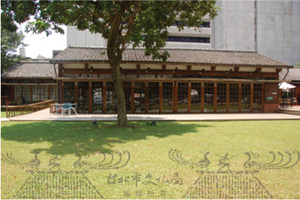Tsai Jui-yueh Dance Research Institute
Born in Tainan City in 1921, Tsai Jui-yueh was a pioneer who devoted her life to Taiwan's modern dance. She left for Japan in 1937 to study at a Tokyo academy run by renowned dancer Ishii Baka. In 1947 Tsai married poet and National Taiwan University literature professor Lei Shih-yu. She bought a Japanese-style wooden house used for government officials during the period of Japanese rule from 1895 to 1945 and used it as her dance school in 1953. Thanks to her dance teaching, performances and international exchange programs, her school – the Tsai Jui-yueh Dance Research Institute – has often been regarded as the cradle of Taiwan's modern dance. The institute not only functioned as a literary salon for dancers, musicians, playwrights and writers, but also inspired many young people to learn dancing during the Taiwan's Martial Law era between 1949 and 1987. It also provided local young dancers with a useful window on the world because American avant-garde dancer-choreographers Merce Cunningham and Martha Graham as well as Australian modern dancer-choreographer Elizabeth Cameron Dalman had visited it. In 1999 Taipei City Government designated the institute as a historic site but it was badly damaged by fire in the same year. With the concerted efforts of both the public and private sectors, the building reopened in 2007. The reconstructed institute was renamed the Rose Heritage Site as a tribute to Tsai's creation "The Prison and the Rose" in 1953. After her husband was arrested in 1949 and expelled to Guangdong Province, Tsai was detained a few months later and served three years as a political prisoner on Green Island. In the future, the institute will showcase Tsai's videos and historical records, promoting dance for children in elementary and secondary schools and inviting international dance companies to exchange ideas with Taiwan's dancers.  Name: Tsai Jui-yueh Dance Research Institute
Name: Tsai Jui-yueh Dance Research Institute
Date of establishment: May 13, 2007
Construction type: Municipal heritage site
Telephone: 02-2560-5724
Address: No.10, Ln. 48, Sec. 2, Zhongshan N. Rd., Zhongshan Dist., Taipei City 104, Taiwan (R.O.C.)
Website: https://www.dance.org.tw/

![Taiwan.gov.tw [ open a new window]](/images/egov.png)
